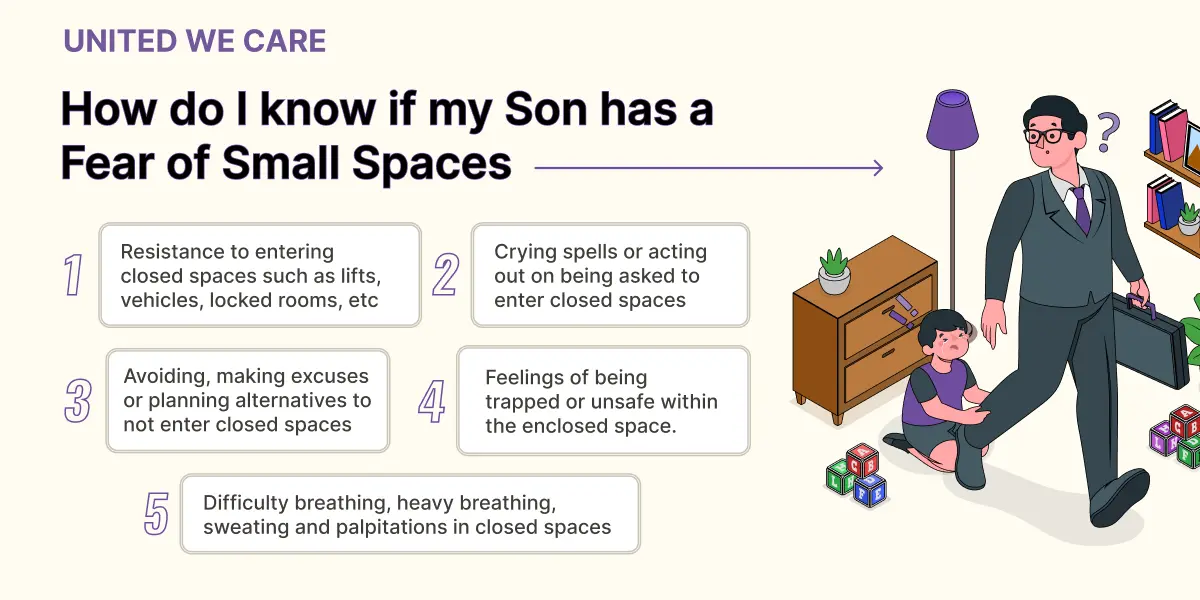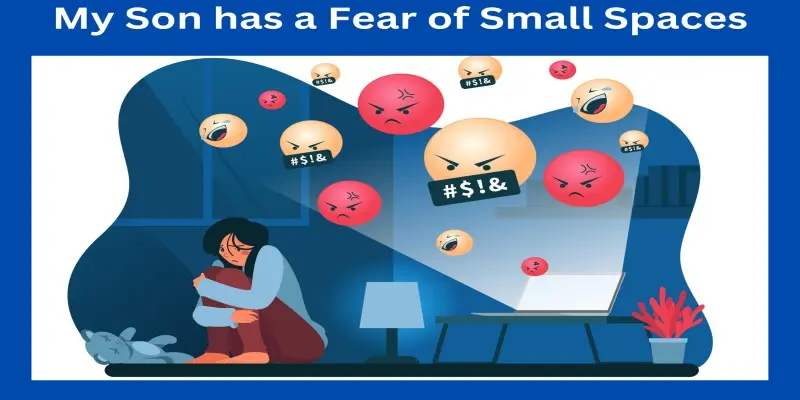Introduction
In order to address the concerns of a child afraid of small spaces, first, it’s important to understand where the fear has originated from. It can be difficult and distressing for a parent to manage a child with such fear.
Through this article, we address the concerns and find possible solutions for them.
What is Fear of Small Spaces?
Without a doubt, everyone experiences some or the other form of fear as a child that they eventually grow out from. But, certain fears could point towards a psychological condition or an issue that does not go away on its own. Fear of small or enclosed spaces could indicate the psychological condition of Claustrophobia.
Claustrophobia literally means the fear of closed spaces. Those who have claustrophobia become increasingly anxious when in an enclosed or small space. These small spaces could be anything from a lift to your home attic. It is not necessary to have an imminent danger for the fear to arise. Sometimes, the fear starts to develop as you enter the small space.
Similarly, other reasons for fear of small spaces could be anxiety about being stuck in spaces (agoraphobia) or a traumatic incident involving an enclosed space (PTSD). It is important to connect to technically advanced guides and professionals for a diagnosis.
How do I know if my Son has a Fear of Small Spaces?
As mentioned above, knowing why your son has a specific fear might require assistance from professionals. However, there could be early signs and symptoms that can be identified by parents or caregivers at home. The signs can help you decide if your son needs medical care or not.
While different children exhibit different reactions to being scared, there are some common underlying signs of claustrophobia. These include :

- Resistance to entering closed spaces such as lifts, vehicles, locked rooms, etc
- Crying spells or acting out on being asked to enter closed spaces.
- Avoiding, making excuses, or planning alternatives to not enter closed spaces.
- Feelings of being trapped or unsafe within the enclosed space.
- Difficulty breathing, heavy breathing, sweating, and palpitations in closed spaces.
Other than the above-mentioned signs, you need to look out for signs of anxiety as well. Sometimes, specific enclosed spaces bring about overthinking and constant ruminations about being trapped or unable to escape.
What should I do if my Son has a Fear of Small Spaces?
Practically, it can be distressing as a parent to see your son be fearful. A common response is to tell your son to face the fear. Unfortunately, if he has claustrophobia, it will not help. Foremost, it is important to observe and identify the signs and the spaces that create a fear-based reaction in your son.
Secondly, identifying the signs might require being patient and open towards your son. If your son feels that he’s being pushed to deal with the fear, the fear might increase. It is important to provide safety and comfort whenever your son expresses related concerns. Alternatively, practicing relaxing activities together will help your son manage the panic that comes with the fear.
Thirdly, unlike most childhood fears, a phobia does not subside with age. Rather, if left ignored or untreated, it might increase with time. Furthermore, such a fear could act as a barrier to performing day-to-day activities. It is important to have alternatives ready so that minimal functioning is affected due to such fears.
How do I help my Son to Overcome Fear of Small Spaces?
Essentially, there are several approaches to managing your son’s fear of enclosed spaces. Proper management requires understanding the specific nature of the fear and other needs of the child. Some suitable management options are mentioned below; these can be used stand-alone or in combination.
Working with the Child
Foremost, if you have managed to identify a very limited or milder form of fear developing, start addressing the concerns right away. This will not only limit the fears from intensifying, but in some cases, it might also resolve the concerns altogether. Try discussing your child’s fear and accompanying them to the enclosed spaces. Finally, using relaxation techniques and guides will help your son overcome the bodily sensations caused by fear.
Therapies
Ideally, psychotherapies have proven to be the most sought-after management solution to the fear of enclosed spaces. Behaviour therapies such as Cognitive Behaviour Therapy or CBT help focus on the negative and automatic fearful thoughts that arise when your son is in an enclosed space and change them.
Also exposure therapy is another famous therapy that addresses phobias by systematically exposing the child from the least feared situation to gradually increasing the intensity of fearful situations.
Medications
By the same token, certain fears might be more difficult to deal with than others. Such fears might bring about panic-like issues in your son. To overcome these difficulties caused by fears, consider reaching out to a trained and licensed psychiatrist or other medical professional for supportive medications. This will help your son in becoming functionally independent of the fear.
Conclusion
All in all, in this article, we discussed how understanding the root cause and manifestations of the fear will help you comprehend the fear of enclosed spaces. Management of the fear will require a combination of the above-mentioned solutions.
In conclusion, claustrophobia could be the main cause of your son’s fear of enclosed spaces. To learn more about how to manage claustrophobia, here are a few tips mentioned in this article. Reach out to trained professionals and guides from United We Care.
References
[1] J. van Andel, “Places Children Like, Dislike, and Fear,” Children’s Environments Quarterly, vol. 7, no. 4, pp. 24–31, 1990, Available: https://www.jstor.org/stable/41514756
[2] C. Vadakkan and W. Siddiqui, “Claustrophobia,” PubMed, 2020. https://www.ncbi.nlm.nih.gov/books/NBK542327/[3] S. Wilson, “Management of Child Patient Behavior: Quality of Care, Fear and Anxiety, and the Child Patient,” Pediatric Dentistry, vol. 35, no. 2, pp. 170–174, Apr. 2013, Accessed: Oct. 31, 2023. [Online]. Available: https://www.ingentaconnect.com/content/aapd/pd/2013/00000035/00000002/art00012










